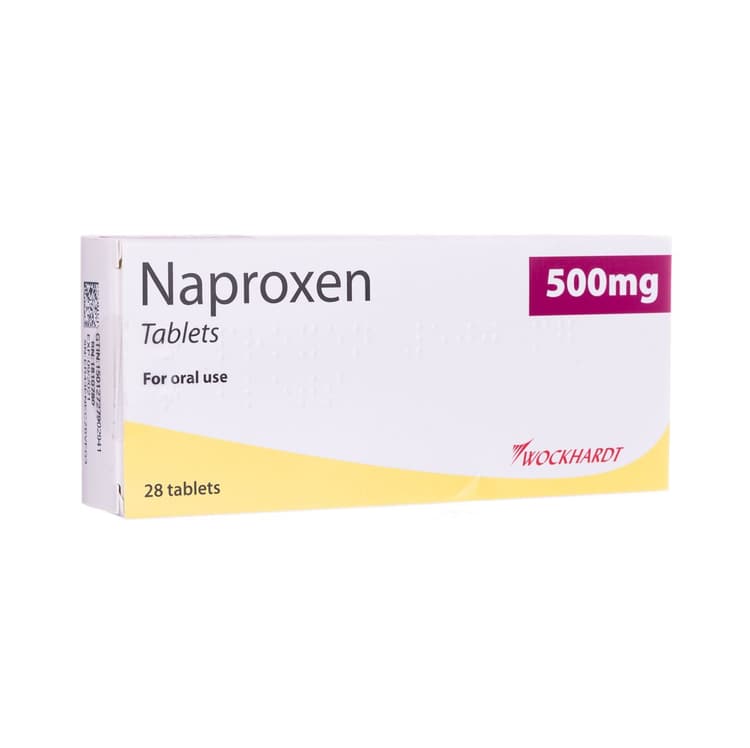Naproxen

Images for illustrative purposes only
Start Your Expert Consultation
Naproxen is a medication that is used to provide pain relief from various ailments. Naproxen is a nonsteroidal anti-inflammatory drug or NSAID.
We also offer Naproxen for gout treatment.
- Effective pain relief
- Works for aches, pains and inflammation
- Non-steroidal anti-inflammatory drug
- Genuine medication
- All drugs sourced in the UK
More information
A Doctor's Overview
 | GP and surgeon, Dr Shane Charles (MBBS, MRCS, PgDip SEM) provides a simple explanation of the medication below: 'Naproxen is a non-steroidal anti-inflammatory drug that is used in the management of musculoskeletal pain, gout, osteoarthritis arthritis and rheumatoid arthritis. '. |
Buying Naproxen Online in the UK
Buy Naproxen Online
After an online consultation with a doctor, you will be able to buy Naproxen from UK Meds if your conditions indicate it and if your prescription is approved, saving you a GP visit. If you already have a prescription, we can fulfill it for you. If not, the online consultation will ensure that this medication is the right one for your medical condition. Our customer service team is always on hand to help with any questions you might have.
Can I buy Naproxen over the counter?
Naproxen Over The Counter
No. Naproxen is not available as an over the counter medication in the UK as it is a prescription only medication (POM) (NHS, 2022). If you wish to purchase this medication, but do not have a prescription, our online consultation service with a doctor may be able to help you. You can take advantage of this service during the check-out process.
Naproxen is available on prescription as tablets or as a liquid that you drink. Teenagers over the age of 15 years old and adults can buy Naproxen for period pain.
Can I buy Naproxen over the counter at Boots?
Naproxen Boots
At the time of writing, generic Naproxen is not available at Boots. However, should you wish to purchase Naproxen tablets at a great price online, you can do so at UK Meds. Additionally, if you would like to purchase more than one pack of Naproxen, you can benefit from further savings at UK Meds with our UK Meds Plus subscription service.
Can I buy Naproxen at Superdrug?
Naproxen Superdrug
At the time of writing, generic Naproxen is not available at Superdrug. However, should you wish to purchase Naproxen tablets at a great price online, you can do so at UK Meds. Additionally, if you would like to purchase more than one pack of Naproxen, you can benefit from further savings at UK Meds with our UK Meds Plus subscription service.
Can I buy Naproxen at Tesco?
Naproxen Tesco
At the time of writing, generic Naproxen is not available at Tesco. However, should you wish to purchase Naproxen tablets at a great price online, you can do so at UK Meds. Additionally, if you would like to purchase more than one pack of Naproxen, you can benefit from further savings at UK Meds with our UK Meds Plus subscription service.
Summary of Naproxen
| Type of drug | nonsteroidal anti inflammatory drug (NSAID) |
| Health conditions prescribed for | Gout, rheumatoid arthritis symptoms (swelling, inflammation, joint pain & stiffness), allergic reaction |
| Active Ingredients | Naproxen |
| Brand names | Aleve |
| Available strengths | 250mg, 500mg |
| Available as | Tablets |
| Possible side effects | Rash, dizziness, sleepiness / tiredness, changes in vision, confusion, headaches, ringing in the ears, gastrointestinal side effects (indigestion, stomach pain, heartburn, nausea), high blood pressure |
| Patient Information Leaflet | For more information on the medication please refer to the patient information leaflet for the Naproxen. |
Naproxen - Key Information
What is Naproxen?
It is a medication that is used to provide pain relief from various ailments, including as a gout treatment and ankylosing spondylitis. It is not recommended as a treatment for ulcerative colitis or Crohn's disease due to the risk of adverse effects. There is an increased risk of heart attack and heart disease / heart failure when using Naproxen tablets as a medicine. Naproxen is a nonsteroidal anti-inflammatory drug or NSAID.
Video: An overview of Naproxen
In the video below Advanced Specialist Pharmacist at the University Hospitals of Leicester, Yasir Sacranie MPharm PGDip (GPhC number: 2215086), explains key facts about Naproxen:
@micropharm Pharmacist explains naproxen #fyp #foryoupage #pharmacy #medicine ♬ original sound - Yasir Sacranie
How does Naproxen work?
Naproxen is a chronic pain relief treatment that works by blocking the body’s production of certain natural substances that cause inflammation called prostaglandins.
What are the benefits of using Naproxen?
Naproxen is a medicine that is beneficial in providing relief from acute pain to moderate pain and minor aches from various conditions such as headaches, tendonitis, muscle aches, menstrual cramps, and dental pain. It is also beneficial in reducing the pain, swelling, and joint stiffness caused by gout attacks, bursitis, and rheumatoid arthritis. The treatment contains naproxen sodium.
You should read first the medication guide or patient information provided for in the information leaflet that comes with the product package before you start using Naproxen as a treatment. Ask your doctor or your pharmacist if you have any questions about the use and safety of the medication.
What experiences have Naproxen users had?
Naproxen Reviews
To see what patients have to say about their experiences with the painkiller medicine, take a look at the Naproxen user reviews and experiences from UK Meds customers above and for further information take a look at the user experiences with the medication at Drugs.com and Web MD.
It is important to note that people may have different experiences when they use Naproxen. If someone states that their medication did not work as they had hoped, it does not mean that it will not work for you. If you believe that Naproxen tablets are the right medication for you then the best thing to do is to consult your doctor or healthcare professional, and judge the medication based on your own experiences if they recommend it as a treatment.
Patient Information Leaflet
For more information on the prescription medication patients should refer to the Naproxen patient information leaflet.
Directions
Take Naproxen by mouth as directed by your doctor with a full glass of water. Avoid lying down within ten minutes after taking this medication. Take Naproxen with food, milk, or an antacid in order to avoid having an upset stomach.
To reduce the risk of stomach bleeding, a stomach ulcer and other serious side effects, such as high blood pressure, take Naproxen at the lowest effective dose for the shortest possible time. Do not increase your dose or take Naproxen more than directed by your doctor. For ongoing conditions such as arthritis, take this medication continuously as directed by your doctor. For rheumatoid arthritis, the full benefit of this drug may show after about two weeks of continuous use.
If you are taking Naproxen as needed, you should remember that pain medication like Naproxen works best as a treatment when used as the first signs of pain occur. The medication may not work well if you wait until the pain has worsened.
Inform your doctor or healthcare provider if your condition does not improve or if it gets worse.
What are the different types of Naproxen and how should I take them?
1. Standard Tablets
- Take with or just after a meal to protect your stomach.
- Swallow whole with water.
2. Gastro-Resistant Tablets
- Coated to bypass the stomach and dissolve in the intestine.
- Do not crush or chew. Swallow whole with or just after food.
3. Effervescent Tablets
- Dissolve 1 to 2 tablets in a full glass of water before drinking.
- After finishing, add a small amount of water to the glass, swirl, and drink to ensure no medicine is left.
How long should I take it for?
- Short-term use: For conditions like back pain or period pain, naproxen is usually taken for 1-2 days.
- Long-term use: For chronic conditions such as rheumatoid arthritis, you may need to take it for longer. Your doctor may also prescribe a stomach-protecting medicine if you’re on naproxen for an extended period.
Tip: Always use the lowest effective dose for the shortest duration. If you’re unsure, speak with your GP.
What should I do if I miss a dose?
- Missed Dose: Take it as soon as you remember, unless it’s close to your next dose.
- Do not double up: Skip the missed dose if it’s nearly time for the next one.
- Use alarms or reminders to help you stay on track, and ask a pharmacist for tips if needed.
Dosage
What is the proper dosage for Naproxen?
The usual dose of Naproxen is dependant on the health condition being treated and should be dosed as directed by your doctor. The dosage of this medication is based on your medical condition and your response to the treatment. For example, according to the NHS (2022) typically for:
- Muscle pain and bone disorders and painful period pain / menstrual pain - take 500mg initially, then 250mg every 6-8 hours as required
- Gout attacks - take 750mg, then 250mg every 8 hours until the gout attack has passed
- Joint conditions - 500mg - 1000mg a day in 1 or 2 doses
Side Effects
A pharmacist's overview of the side effects of this medication and how to manage them:
 | Senior Specialist Pharmacist, Dania Al-Zarrad, provides a simple explanation of the common side effects of the medication and how you can manage them: Can cause gi upset and headache, with gi bleeding and renal impairment as serious effects; take with food and avoid in ulcers or renal disease. |
Naproxen FAQs
Does Naproxen make you sleepy?
Tiredness, drowsiness and dizziness (all of which are linked to feeling sleepy) are reported common side effects of Naproxen.
Is Naproxen stronger than Ibuprofen?
Whilst they are both a pain relief treatment, Naproxen is longer acting in comparison to ibuprofen, which itself is a short acting pain relief medication.
Can Naproxen cause constipation?
Yes. Naproxen is a treatment that could potentially cause constipation, along with similar adverse effects such as wind and diarrhoea.
Is Naproxen an opioid?
No. Naproxen is not an opioid (narcotic drug) treatment, it is an NSAID (nonsteriodal anti-inflammatory drug.
Sources
Here to help you
Our Customer Service is available Monday to Friday 9am - 5pm. If you need urgent assistance, do not use this service. Call 111, or in an emergency call 999. Visit our help section


